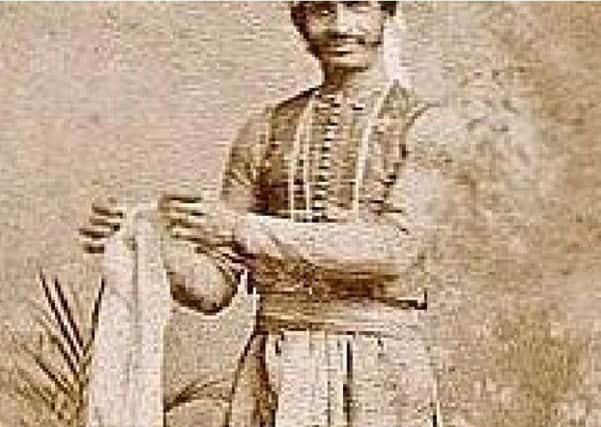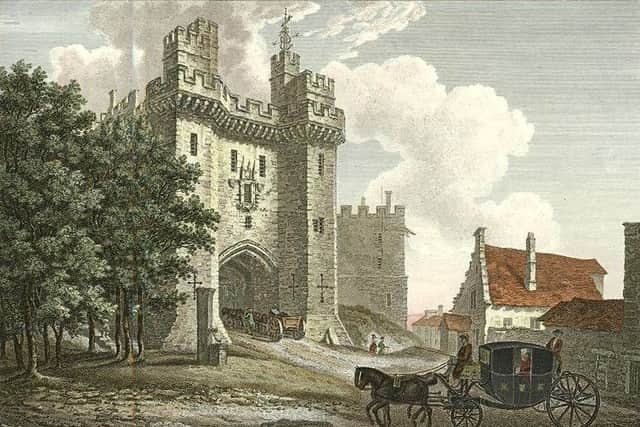Indian snake charmer jailed for razor attack on Lancaster wife


In 1880 Sheik Gheesa, an Indian snake charmer, who had played the Music Halls in Scotland visited Lancashire appearing at Birkenhead and Lancaster.
Whilst at Lancaster he made the acquaintance of Alice Ann Ribchester, who lived with her parents at nearby Torrisholme.


Advertisement
Hide AdAdvertisement
Hide AdA whirlwind romance followed and after a proposed wedding at Lancaster was cancelled the pair eloped to London where they married.
Gheesa was becoming a popular conjurer in the theatre world and his career flourished in London where the couple had two children within three years.
In early July 1884 Geesha secured a week-long booking at the original Winter Gardens in Morecambe and the couple saw it as a chance to stay with her parents.
They arrived at Torrisholme a couple of weeks before the booking, but instead of a happy family reunion the couple seemed strained in their relationship and quarrels were all too frequent.
Advertisement
Hide AdAdvertisement
Hide AdGeesha’s stage performances proved very popular in Morecambe and he charmed the audiences.
However, on the second Saturday of July the life of the couple would change forever.
That day Gheesa told his wife of his plans to immediately return to London, but his wife was vexed as she had made plans for the family to stay a couple of weeks at nearby Wennington where she had an aunt.
What followed led to Sheik Gheesa appearing in the Lancaster police court held in Lancaster Castle on the following Monday morning charged with the attempted murder of his wife who was not fit to attend.
Advertisement
Hide AdAdvertisement
Hide AdThe prosecution outlining the case claimed that angry words had been exchanged and that Gheesa had drawn a razor from his pocket, flung her to the floor and tried to cut her throat. Although that had failed, a fearful gash was inflicted from her mouth to her right cheek, another across the forehead, and another to her right ear lobe. The woman also had lacerations to her hands and fingers after trying to protect herself.
Only the intervention of her mother who rushed in from the garden prevented further injuries, although she also received a cut to her left arm as she intervened.
After coolly washing his bloodied hands and the razor Gheesa had left the house before neighbours arrived.
As Gheesa was making good his escape two men who he was passing on the lane closed in on him, took the razor from his grasp and handed him over to the police.
Advertisement
Hide AdAdvertisement
Hide AdA local doctor who quickly attended feared for the life of Alice Ann who had lost a lot of blood and they called a magistrate to take her dying deposition.
In his defence Gheesa claimed his wife had made insulting racist remarks about his colour and his place in society. The magistrates duly remanded Gheesa in custody whilst the events progressed.
As Mrs Gheesa made a slow but successful recovery further hearings kept the accused in custody. Eventually in early November 1884 the trial of Sheik Gheesa took place at Manchester Assizes with counts of attempted murder and inflicting grievous bodily harm laid before him.
Mrs Gheesa whose face was clearly disfigured in a shocking manner was well enough to give evidence and she appeared in the witness box to support the statements of the prosecution.
Advertisement
Hide AdAdvertisement
Hide AdShe testified that she had given the accused no reason to be jealous of her, insisting she had not made any racist comments about his colour.
In his defence it was admitted the accused had inflicted the injuries, but claimed he had no intention of murdering his wife.
It was suggested that he was a passionate person who had received much provocation and that he was clearly sorry for his actions.
The jury returned from their deliberations within 20 minutes and brought a verdict of guilty of wounding with intent to do grievous bodily harm.
Advertisement
Hide AdAdvertisement
Hide AdHis Lordship Mr Justice Smith then informed the prisoner that he would go to penal servitude for 10 years.
It was reported in mid-January 1888 that the former Indian snake charmer, aged 35, had committed suicide in Chatham Prison by hanging himself from the bars of the closet window using a pair of braces.